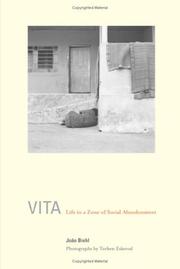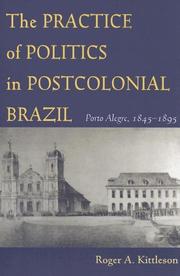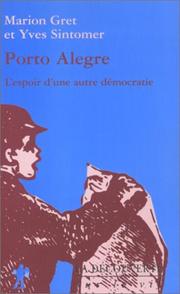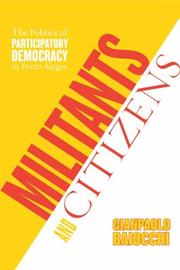| Listing 1 - 10 of 11 | << page >> |
Sort by
|
Book
ISBN: 8585279532 Year: 1994 Publisher: Porto Alegre Ortiz
Abstract | Keywords | Export | Availability | Bookmark
 Loading...
Loading...Choose an application
- Reference Manager
- EndNote
- RefWorks (Direct export to RefWorks)

ISBN: 0520242777 0520242785 9780520242784 Year: 2005 Publisher: Berkeley : University of California Press,
Abstract | Keywords | Export | Availability | Bookmark
 Loading...
Loading...Choose an application
- Reference Manager
- EndNote
- RefWorks (Direct export to RefWorks)
Zones of social abandonment are emerging everywhere in Brazil's big cities-places like Vita, where the unwanted, the mentally ill, the sick, and the homeless are left to die. This haunting, unforgettable story centers on a young woman named Catarina, increasingly paralyzed and said to be mad, living out her time at Vita. Anthropologist João Biehl leads a detective-like journey to know Catarina; to unravel the cryptic, poetic words that are part of the ""dictionary"" she is compiling; and to trace the complex network of family, medicine, state, and economy in which her abandonment and pathology
Institutional care --- Marginality, Social --- #SBIB:39A74 --- #SBIB:39A9 --- Exclusion, Social --- Marginal peoples --- Social exclusion --- Social marginality --- Benevolent institutions --- Care, Institutional --- Charitable institutions --- Homes (Institutions) --- Etnografie: Amerika --- Medische antropologie / gezondheid / handicaps --- Vita (Asylum : Porto Alegre, Rio Grande do Sul, Brazil) --- Soins en institutions --- Exclusion sociale --- Assimilation (Sociology) --- Culture conflict --- Social isolation --- Sociology --- People with social disabilities --- Charities --- Public institutions --- Public welfare --- Deinstitutionalization
Book
ISBN: 9782343059709 2343059705 Year: 2015 Publisher: Paris : L'Harmattan,
Abstract | Keywords | Export | Availability | Bookmark
 Loading...
Loading...Choose an application
- Reference Manager
- EndNote
- RefWorks (Direct export to RefWorks)
Le budget participatif de Porto Alegre au Brésil est fréquemment cité en exemple comme modèle de prédilection offrant une alternative crédible à la démocratie libérale. En donnant accès à ce nouvel espace public aux citoyens, il a redéfini notre conception de la communauté politique et notre rapport avec le pouvoir. Mais, plus de vingt-cinq ans après sa création, que reste-t-il de ce modèle de démocratie participative ?--
Political participation --- Deliberative democracy --- Local budgets --- Participation politique --- Démocratie délibérative --- Budgets locaux --- Citizen participation --- Participation des citoyens --- Porto Alegre (Rio Grande do Sul, Brazil) --- Brazil --- Porto Alegre (Rio Grande do Sul, Brésil) --- Brésil --- Politics and government --- Politique et gouvernement
Book
ISBN: 0520951468 9780520951464 1299952887 9781299952881 9780520272958 0520272951 Year: 2013 Publisher: Berkeley (Calif.) : University of California Press,
Abstract | Keywords | Export | Availability | Bookmark
 Loading...
Loading...Choose an application
- Reference Manager
- EndNote
- RefWorks (Direct export to RefWorks)
"Zones of social abandonment are emerging everywhere in Brazil's big cities - places like Vita, where the unwanted, the mentally ill, the sick, and the homeless are left to die. This haunting, unforgettable story centers on a young woman named Catarina, increasingly paralyzed and said to be mad, living out her time at Vita. Anthropologist João Biehl leads a detective-like journey to know Catarina; to unravel the cryptic, poetic words that are part of the "dictionary" she is compiling; and to trace the complex network of family, medicine, state, and economy in which her abandonment and pathology took form. As Biehl painstakingly relates Catarina's words to a vanished world and elucidates her condition, we learn of subjectivities unmade and remade under economic pressures, pharmaceuticals as moral technologies, a public common sense that lets the unsound and unproductive die, and anthropology's unique power to work through these juxtaposed fields. Vita's methodological innovations, bold fieldwork, and rigorous social theory make it an essential reading for anyone who is grappling with how to understand the conditions of life, thought and ethics in the contemporary world"--Book cover.
Institutional care --- Marginality, Social --- Benevolent institutions --- Care, Institutional --- Charitable institutions --- Homes (Institutions) --- Charities --- Public institutions --- Public welfare --- Deinstitutionalization --- Exclusion, Social --- Marginal peoples --- Social exclusion --- Social marginality --- Assimilation (Sociology) --- Culture conflict --- Social isolation --- Sociology --- People with social disabilities --- Vita (Asylum : Porto Alegre, Rio Grande do Sul, Brazil) --- anthropology and social theory. --- anthropology students. --- brazilian culture. --- brazilian economy. --- brazilian ethnography. --- brazilian health care. --- cultural anthropology. --- ethics and morality. --- healthcare and poverty. --- international health care. --- international mental health. --- international studies. --- latin american culture. --- latin american healthcare. --- medical anthropology. --- mental illness. --- social services and welfare. --- south american anthropology. --- south american culture. --- south american ethnography. --- south american mental health. --- Porto Alegre (Brasil) --- Brasil --- Institutional care. --- Marginality, Social. --- Soins en institutions --- Vita (Asylum : Porto Alegre, Rio Grande do Sul, Brazil). --- Brazil

ISBN: 082295897X 1322183112 0822972891 9780822972891 9780822958970 0822942666 9780822942665 Year: 2006 Publisher: Pittsburgh University of Pittsburgh Press
Abstract | Keywords | Export | Availability | Bookmark
 Loading...
Loading...Choose an application
- Reference Manager
- EndNote
- RefWorks (Direct export to RefWorks)
"The Practice of Politics in Postcolonial Brazil traces the history of high and low politics in nineteenth-century Brazil from the vantage point of the provincial capital of Porto Alegre. In the immediate postcolonial period, new ideas about citizenship and freedom were developing, and elites struggled for control of the state as the lower classes sought inclusion in political life. The emergent Liberal Party, while initially successful in dismantling Portuguese trade restrictions, later came to be viewed as an elitist group that staved off threats to the systems of slavery, patronage, and the class hierarchy."--Jacket.
Political participation --- Social movements --- Movements, Social --- Social history --- Social psychology --- Citizen participation --- Community action --- Community involvement --- Community participation --- Involvement, Community --- Mass political behavior --- Participation, Citizen --- Participation, Community --- Participation, Political --- Political activity --- Political behavior --- Political rights --- Social participation --- Political activists --- Politics, Practical --- History --- Porto Alegre (Rio Grande do Sul, Brazil) --- Prefeitura de Porto Alegre (Brazil) --- Prefeitura Municipal de Porto Alegre (Brazil) --- Politics and government --- Geschichte 1845-1895 --- 1800-1899

ISBN: 1626371377 9781626371378 1555878938 9781555878931 Year: 2000 Publisher: Boulder
Abstract | Keywords | Export | Availability | Bookmark
 Loading...
Loading...Choose an application
- Reference Manager
- EndNote
- RefWorks (Direct export to RefWorks)
Countless studies of citizen participation in public decisionmaking point out the limitations of direct democracy when it is transported from the realm of political theory into the "real world." In contrast, this book examines a case where an innovative city government gave major decisionmaking power to ordinary citizens on a large scale—and managed to survive and prosper. Since 1989, the government of Porto Alegre, Brazil, led by the Workers' Party, has implemented a participatory budget program that is becoming a model for policymakers worldwide. Each year in this regional capital of 1.3 million people, residents meet in their neighborhoods to determine budget priorities. Tens of thousands attend the annual budget assemblies. Nearly a thousand work as delegates year-round, and a popularly elected council has final say on all city spending. Inventing Local Democracy tells this dramatic story of a group of activists who came to power in a city long dominated by patronage politics and elite rule. At the same time, it is a sociopolitical study of the impact that state-sponsored participatory forums can have on civil society. Examining this dual transformation, Abers provides a groundbreaking contribution to the theory of participatory democracy.
Political participation --- Local government --- Local administration --- Township government --- Subnational governments --- Administrative and political divisions --- Decentralization in government --- Public administration --- Citizen participation --- Porto Alegre (Rio Grande do Sul, Brazil) --- Prefeitura de Porto Alegre (Brazil) --- Prefeitura Municipal de Porto Alegre (Brazil) --- Politics and government --- Citizen participation. --- Administration locale --- Participation politique --- Case studies. --- Participation des citoyens --- Cas, Etudes de --- Porto Alegre (Brazil) --- Porto Alegre (Rio Grande do Sul, Brésil) --- Politique et gouvernement
Book
ISBN: 0826359450 9780826359452 9780826359445 Year: 2018 Publisher: Albuquerque
Abstract | Keywords | Export | Availability | Bookmark
 Loading...
Loading...Choose an application
- Reference Manager
- EndNote
- RefWorks (Direct export to RefWorks)
"This anthropological study of grassroots community leaders in Porto Alegre, Brazil's leftist hotspot, focuses on gender, politics, and regionalism during the early 2000s, when the Workers' Party (Partido dos Trabalhadores) was in power. The author explores the ways community leaders make sense of official notions of citizenship and how gender, politics, and regional identities shape these interpretations. Junge further examines the implications of leaders' deep ambivalence toward normative participation discourses for how we theorize and study participatory democracy, citizenship, and political subjectivity in Brazil and beyond."--
HISTORY / Latin America / South America. --- SOCIAL SCIENCE / Anthropology / Cultural. --- Elections --- Political participation --- Electoral politics --- Franchise --- Polls --- Political science --- Politics, Practical --- Plebiscite --- Political campaigns --- Representative government and representation --- Partido dos Trabalhadores (Brazil) --- Workers' Party (Brazil) --- PT (Partido dos Trabalhadores (Brazil)) --- P.T. (Partido dos Trabalhadores (Brazil)) --- Parti des travailleurs (Brazil) --- Partido de los Trabajadores (Brazil) --- P.T. Brasil --- Partido de los Trabajadores de Brasil --- Brazilian Workers' Party --- World Social Forum --- Porto Alegre (Rio Grande do Sul, Brazil) --- Politics and government.
Book
ISBN: 0271056770 9780271056777 0271055855 9780271055855 9780271055381 0271055383 0271037954 9780271037950 0271053682 9780271053684 9780271037943 0271037946 Year: 2011 Publisher: University Park The Pennsylvania State University Press
Abstract | Keywords | Export | Availability | Bookmark
 Loading...
Loading...Choose an application
- Reference Manager
- EndNote
- RefWorks (Direct export to RefWorks)
"Addresses the question of why institutions meant to attract citizen participation succeed in strengthening civil society and improving state responsiveness and transparency in some places, but fail in others. Focuses on urban politics in Porto Alegre (Brazil), Montevideo (Uruguay), and Caracas (Venezuela)"--Provided by publisher.
Political participation --- Municipal government --- Comparative government --- Comparative political systems --- Comparative politics --- Government, Comparative --- Political systems, Comparative --- Political science --- Cities and towns --- City government --- Municipal administration --- Municipal reform --- Municipalities --- Urban politics --- Local government --- Metropolitan government --- Municipal corporations --- Citizen participation --- Community action --- Community involvement --- Community participation --- Involvement, Community --- Mass political behavior --- Participation, Citizen --- Participation, Community --- Participation, Political --- Political activity --- Political behavior --- Political rights --- Social participation --- Political activists --- Politics, Practical --- Government --- Porto Alegre (Rio Grande do Sul, Brazil) --- Montevideo (Uruguay) --- Caracas (Venezuela) --- Santiago de León de Caracas (Venezuela) --- Caracas --- Montevideo --- Ciudad de Montevideo (Uruguay) --- Montevidéu (Uruguay) --- Politics and government.

ISBN: 2707136085 9782707136084 Year: 2002 Publisher: Paris: La Découverte,
Abstract | Keywords | Export | Availability | Bookmark
 Loading...
Loading...Choose an application
- Reference Manager
- EndNote
- RefWorks (Direct export to RefWorks)
Archief Jef Moestermans Bibliotheek François Vercammen
Democracy --- Political participation --- Démocratie --- Participation politique --- Porto Alegre (Brazil) --- Porto Alegre (Rio Grande do Sul, Brésil) --- Politics and government --- Citizen participation --- Politique et gouvernement --- Participation des citoyens --- 339 --- 316.621 --- Handel. Internationale economische betrekkingen. Wereldeconomie --binnenlandse als buitenlandse handel; zie ook {339.3} en {339.5} --- Sociale participatie --- 316.621 Sociale participatie --- 339 Handel. Internationale economische betrekkingen. Wereldeconomie --binnenlandse als buitenlandse handel; zie ook {339.3} en {339.5} --- Démocratie --- Porto Alegre (Rio Grande do Sul, Brésil) --- Porto Alegre (Rio Grande do Sul, Brazil) --- Prefeitura Municipal de Porto Alegre (Brazil) --- Economic conditions. --- Citizen participation. --- Prefeitura de Porto Alegre (Brazil) --- Cititzen participation --- Economic conditions --- #SBIB:324H73 --- #SBIB:327.1H20 --- #SBIB:33H071 --- 316.32 --- 316.32 Globale samenlevingsvormen --- Globale samenlevingsvormen --- Politieke verandering: oppositie en minderheid, protest, politiek geweld --- Sociologie van de internationale betrekkingen: algemeen --- Economische internationale betrekkingen --- 330 --- démocratie --- globalisation --- politieke wetenschappen --- politologie --- Political participation - Brazil - Porto Alegre. --- Porto Alegre (Brazil) - Politics and government - Cititzen participation --- Porto Alegre (Brazil) - Economic conditions

ISBN: 0804751226 0804751234 Year: 2005 Publisher: Stanford, Calif. : Stanford University Press,
Abstract | Keywords | Export | Availability | Bookmark
 Loading...
Loading...Choose an application
- Reference Manager
- EndNote
- RefWorks (Direct export to RefWorks)
Political participation --- Political culture --- Civil society --- Participation politique --- Culture politique --- Société civile --- Porto Alegre (Brazil) --- Porto Alegre (Rio Grande do Sul, Brésil) --- Politics and government --- Citizen participation. --- Politique et gouvernement --- Participation des citoyens --- #SBIB:328H32 --- #SBIB:35H6040 --- #SBIB:324H50 --- #SBIB:324H60 --- Instellingen en beleid: Midden en Latijns-Amerika --- Bestuur en beleid: nationale en regionale studies: Latijns-Amerika --- Politieke participatie en legitimiteit (referenda, directe democratie, publieke opinie...) --- Politieke socialisatie --- History. --- Porto Alegre (Rio Grande do Sul, Brazil) --- Société civile --- Porto Alegre (Rio Grande do Sul, Brésil) --- Citizen participation --- Community action --- Community involvement --- Community participation --- Involvement, Community --- Mass political behavior --- Participation, Citizen --- Participation, Community --- Participation, Political --- Political activity --- Political behavior --- Political rights --- Social participation --- Political activists --- Politics, Practical --- Culture --- Political science --- Social contract --- History --- Prefeitura Municipal de Porto Alegre (Brazil) --- Prefeitura de Porto Alegre (Brazil)
| Listing 1 - 10 of 11 | << page >> |
Sort by
|

 Search
Search Feedback
Feedback About UniCat
About UniCat  Help
Help News
News